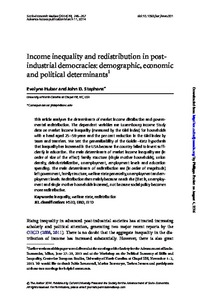Income inequality and redistribution in post-industrial democracies: demographic, economic and political determinants

Huber, Evelyne ; Stephens, John D.
2014
12
2
April
245-267
government policy ; income distribution ; income redistribution ; welfare state ; social inequality
Income distribution
http://dx.doi.org/10.1093/ser/mwu001
English
Bibliogr.
"This article analyses the determinants of market income distribution and governmental redistribution. The dependent variables are Luxembourg Income Study data on market income inequality (measured by the Gini index) for households with a head aged 25–59 years and the per cent reduction in the Gini index by taxes and transfers. We test the generalizability of the Goldin–Katz hypothesis that inequality has increased in the USA because the country failed to invest sufficiently in education. The main determinants of market income inequality are (in order of size of the effect) family structure (single mother households), union density, deindustrialization, unemployment, employment levels and education spending. The main determinants of redistribution are (in order of magnitude) left government, family structure, welfare state generosity, unemployment and employment levels. Redistribution rises mainly because needs rise (that is, unemployment and single mother households increase), not because social policy becomes more redistributive."
Digital
The ETUI is co-funded by the European Union. Views and opinions expressed are however those of the author(s) only and do not necessarily reflect those of the European Union or the ETUI.